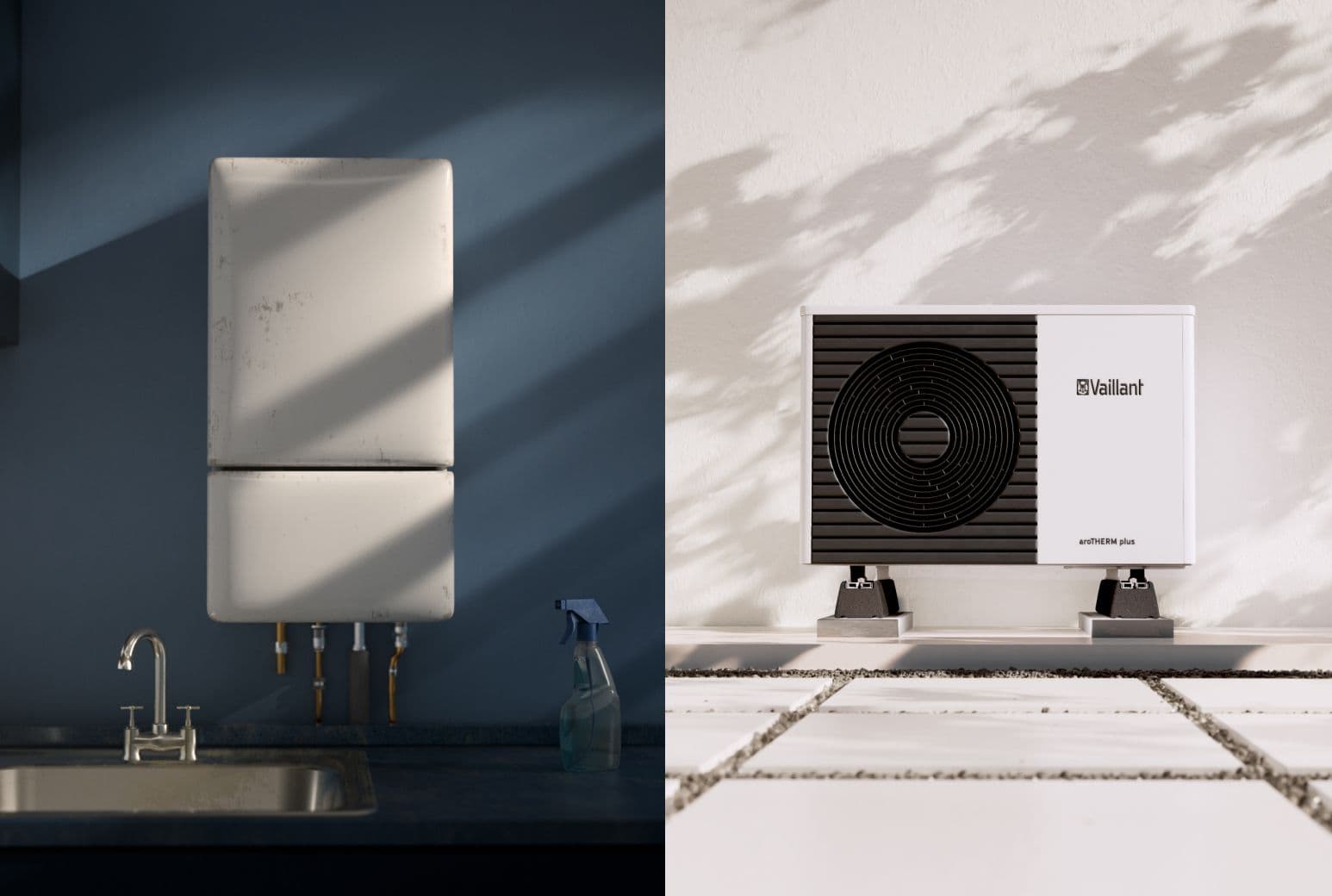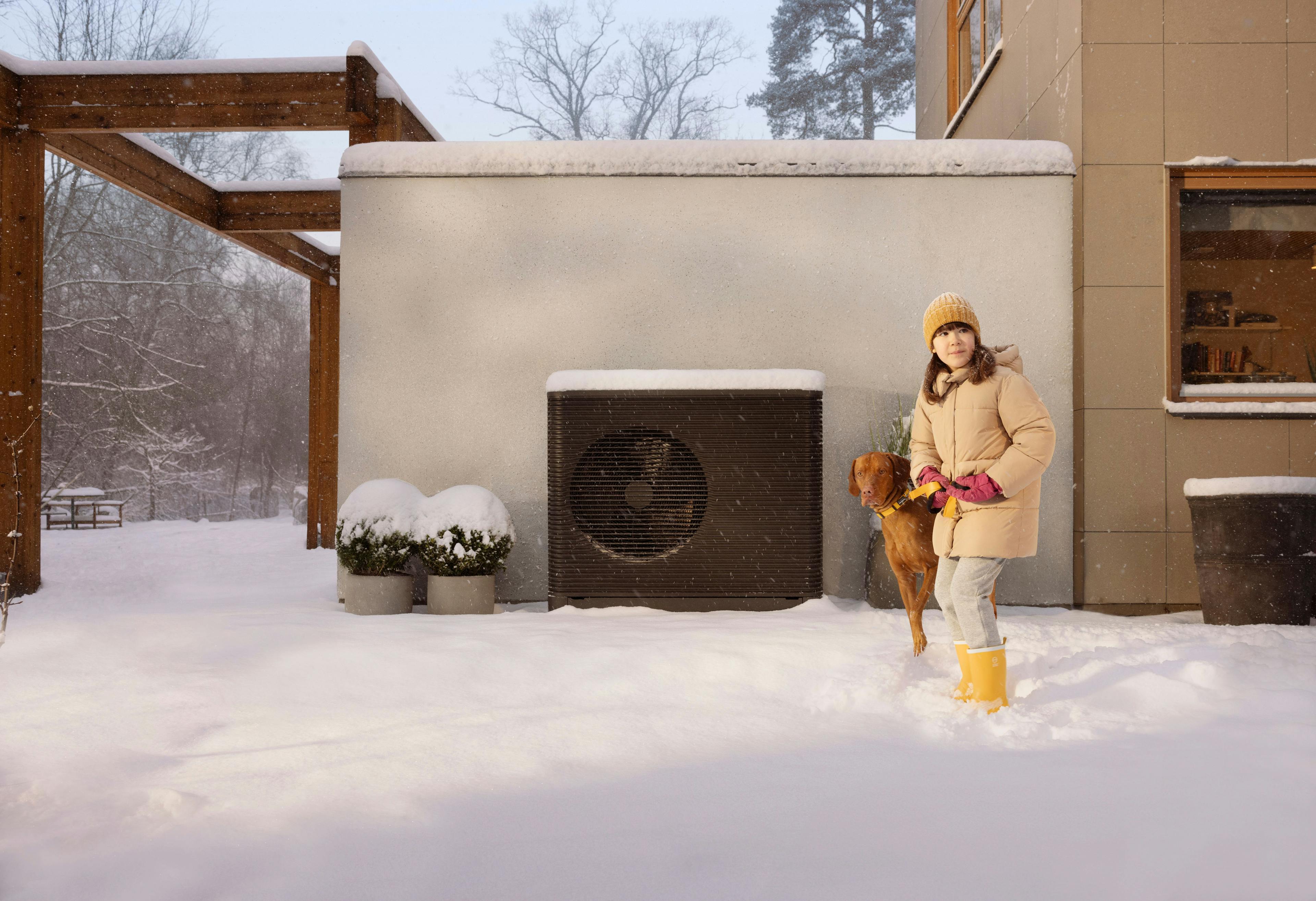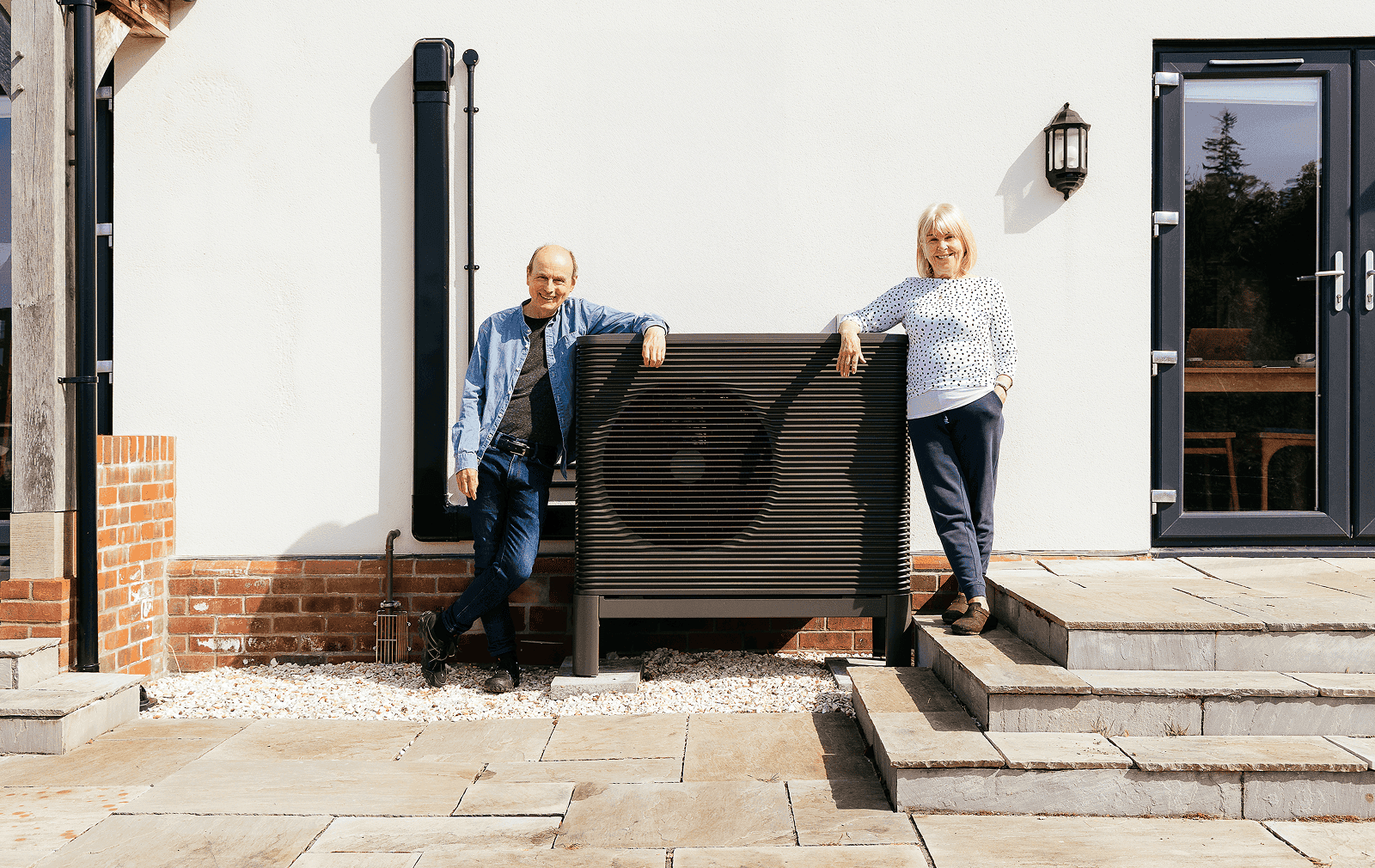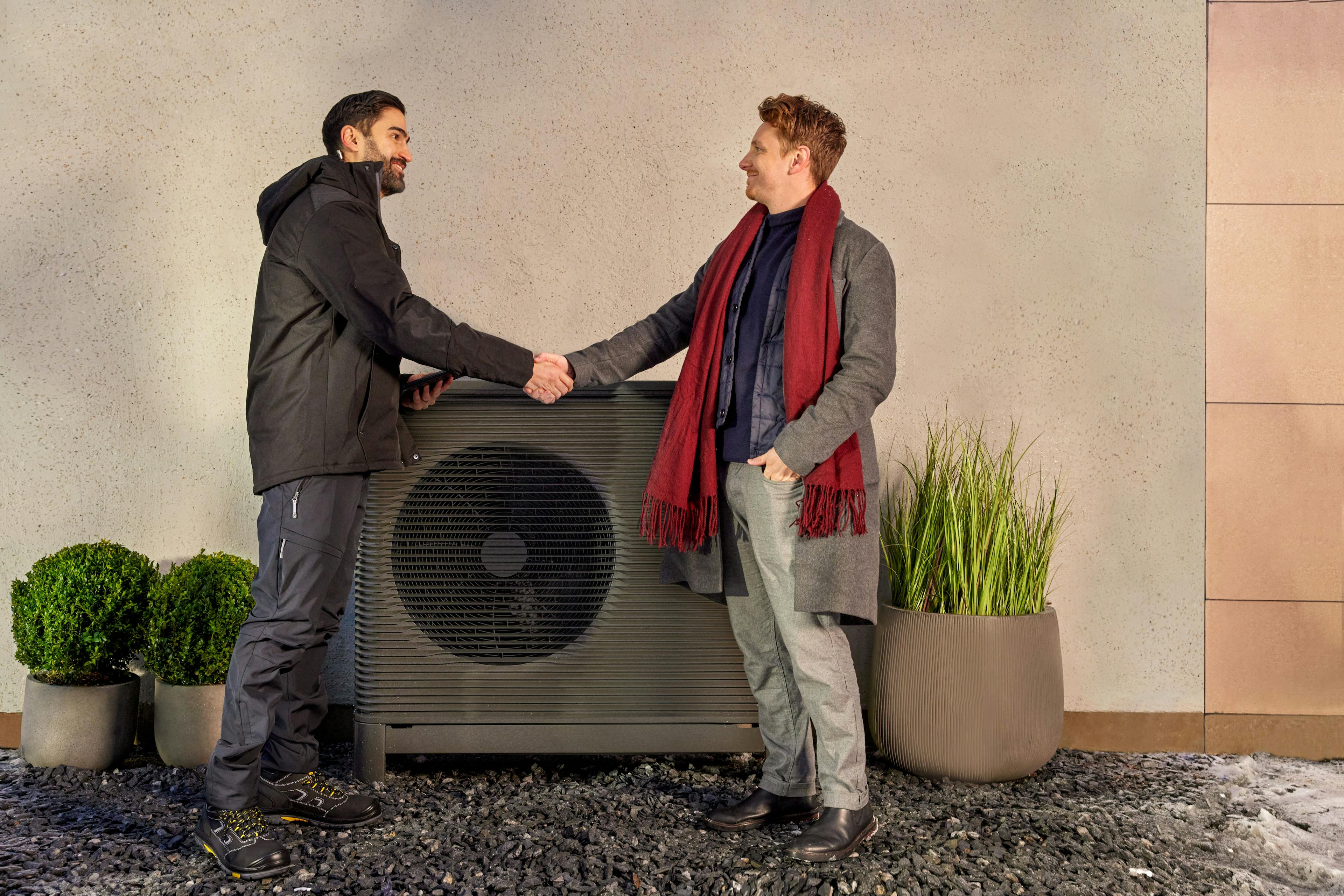7 February 2024
4 minute read
Written by:

Carl Robinson
Copy Lead
Air source heat pumps – pros and cons

Benefits of an air source heat pump
Air source heat pumps are great news for your gas bills and the environment. Read on for the top benefits of switching to this lean, green, house-heating machine.
Air source heat pumps are incredibly efficient
Heat pumps can reach 400% efficiency, meaning that for every unit of energy they use, they produce 4 units of heat – which is about four times more efficient than a traditional gas boiler. This means they use less energy, which means lower household bills and much less impact on the environment.
It may surprise you that even in the harshest of winters, an air source heat pump’s efficiency is still strong. Air source heat pumps can still extract heat from the air below –20 degrees Celsius.

Air source heat pumps lower your monthly heating costs
An air source heat pump is a great way to lower your monthly household costs. There’s no longer any need to fiddle with the thermostat, either. Because of their high efficiency, air source heat pumps don’t need as much energy as gas boilers to heat your home, making the switch to a heat pump cost-effective. Most households can expect to make a saving of around £400 on their energy bills each year. While the upfront cost of an air source heat pump can be off-putting at first, you can benefit from saving £7500 on your heat pump with government grants.
Air source heat pumps are great for the environment
The impact of heat pumps on the environment is overwhelmingly positive. As 85% of British homes still rely on traditional heating systems like boilers for warmth, a shocking 17% of the UK's carbon emissions come from residential heating. One of the biggest pros of air pumps is their comparatively low carbon footprint, as they use fresh air from outside to produce heat. By switching to a heat pump, your house could cut down its carbon emissions by 75% per year. That’s a bigger saving than selling your diesel car. Better still, by powering your home’s electricity supply with solar panels, heat pumps can become a fully carbon-neutral heating system.

Air source heat pumps have a much longer lifespan than gas boilers
Compared to gas boilers, heat pumps have a much longer lifespan. A correctly installed heat pump can last for 20 years whereas gas boilers usually last only 10. When you switch to green heating with Aira, you benefit from the Aira Comfort Guarantee, which includes parts and necessary maintenance if the unexpected happens. Take that, boilers.
Air source heat pumps are quiet
Not keen on a low rumbling or weird clunks in the night? Leave ‘house noises’ in the past. Air pumps have been typecast as noisy or loud, but placed outside with correct installation, they should make as little noise as a fridge.
Heat your home and give you hot water
Heat pumps can work with your existing radiators to heat your home whilst providing your home with hot water for everyday use – all powered by the fresh air from outside, and with no need for a carbon-guzzling boiler.
Air source heat pump disadvantages
When installing an air source heat pump in your home, it’s worth keeping in mind some key factors that can dissuade some homeowners from making the switch, and what to do about them so you can enjoy clean, green energy in your home.
They are most efficient working at lower temperatures
While most houses are ready to install heat pumps from day 1, heat pumps are most efficient when heating your home with lower temperature water than a boiler – but that doesn’t mean a colder home. Your home’s current central heating system and radiators will likely be using higher temperatures than a heat pump system, but all you may need to do to make the most of the heat pump is simply replace some old radiators to feature a larger surface area.
Heat pumps work best with good insulation
If your home is well-insulated, with little or no cold air drafts, you don’t need to worry – heat pumps, like all heating sources, work best with a home that keeps the hot air in, and the cold air out. For good results from a heat pump, ensure you’ve got at least double glazing, and that your doors and attic are well-insulated. Adding proper insulation to your loft and walls will only help reduce your energy bills even further.

They require space inside and outside your house
A heat pump will take up a bit more space than your average gas boiler, but you’d be surprised at how little you’ll notice them once they’re installed.
Outside Space: You’ll need a small amount of room to mount your heat pump outdoor unit. This is rarely an issue, as it’s about the size of a fridge, and the heat pump can fit snugly alongside your home.
Inside Space: The indoor unit and buffer tank will simply fit where your boiler used to be – or another closet, hidden from view.
What type of house do you live in?
Keep learning
Similar articles to expand your knowledge

Published at Jun 19, 2025
Carl RobinsonHeat pump efficiency explained: Everything you need to know before you switch
You’ve probably heard that heat pumps are more energy efficient than boilers. And better for the planet. But what does that really mean day-to-day? And how do you know if those efficiency stats like COP and SCOP will actually translate into lower bills and reliable heating in your home? We break it down.

Published at May 28, 2025
Carl RobinsonPlanning permission just got easier for heat pumps. What does it mean for you?
For some households, outdated planning permission rules have made it hard to switch. But, for thousands of households looking to switch to a heat pump in 2025, those long, unnecessary waits for planning approvals are set to be a thing of the past with changes to the boundary rule as part of the Warm Homes Plan agenda.

Published at May 5, 2025
Regina OnoratoHeat pumps vs. gas boilers: Which is the right choice for you?
How do heat pumps and boilers compare? Let's break it down – upfront costs, efficiency, performance, and long-term savings – so you can make the best choice for your home.

Published at Apr 29, 2025
Carl RobinsonWhat actually happens during an Aira Heat Pump install?
Choosing to ditch your old boiler for an Aira Heat Pump is a big step. One that can lower both your carbon emissions and your energy bills. But what actually happens when you take the leap and say “yes” to Aira? Let’s walk through it.

Published at Apr 22, 2025
Carl RobinsonHeat pump cashback: which banks offer up to £2,000 and how to claim it.
If you're a homeowner looking to upgrade their heating by ditching their boiler for a heat pump, the good news is you might be eligible for more financial help beyond the government grant. Some of the UK’s biggest banks now offer cashback and green finance to help cover the cost of a heat pump installation.

Published at Apr 15, 2025
Carl RobinsonAira vs. Octopus heat pumps. Which one is right for you?
Like Aira, Octopus Energy manufactures and installs its own heat pump: the Cosy. But that’s where the similarities end and the real choice begins. We break down the key differences between Aira and Octopus, and compare the Aira Heat Pump with the Octopus Cosy to see how they stack up.